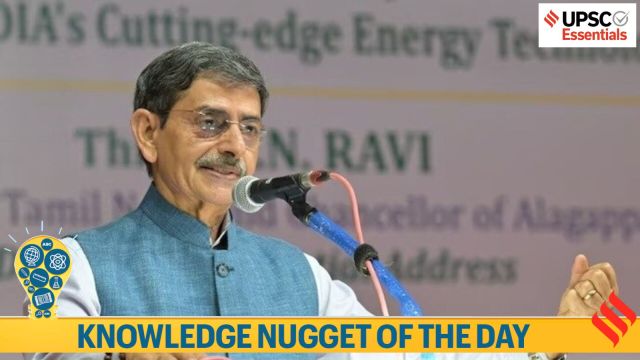Take a look at the essential events, concepts, terms, quotes, or phenomena every day and brush up your knowledge. Here’s your knowledge nugget for today.
Knowledge Nugget: Governor’s Power
Subject: Polity
(Relevance: The office of the Governor and his/her right to withhold assent are crucial for the UPSC CSE Exam, as they highlight constitutional provisions, federal dynamics, discretionary powers, and recent Supreme Court rulings related to the office, which are important for every stage of the exam.)

Why in the news?
The Supreme Court on Monday (February 10) said that Article 200 of the Constitution of India dealing with the Governor’s powers to withhold or give assent to Bills passed by the state legislature expects the Governor to communicate to the state the reasons for withholding assent. The SC bench was hearing petitions filed by the Tamil Nadu government challenging Governor R N Ravi’s decision to withhold assent to certain Bills and forward some to the President.
Key Takeaways :
1.The Governor has his own importance. He is an important figure in the Constitution. He has an important role to play, undoubtedly. On the contrary, the proviso expects the Governor to make himself very clear before the House that look, this is what it has to do,” Justice J B Pardiwala presiding over a two-judge bench said.
2. Attorney General R Venkataramani had argued that the Governor need not have communicated the reasons as the assent was withheld on the ground of repugnancy between the proposed state law, which sought to remove the Governor as Chancellor of the state’s universities, and the Central law — UGC Regulations.
3. The bench, however, wondered how the state would know what objections need to be looked into if the reasons for withholding assent are not communicated to it. “Why can’t you tell the government that, look, I find repugnancy in it? Or in the first instance, if he’s convinced, forward it straight to the President?” said Justice Pardiwala.
What does the Constitution say about the Governor’s role in giving assent to Bills?
1. Article 163 of the Constitution outlines the Governor’s general powers, while Article 200 specifically addresses the Governor’s role in granting assent to Bills. Both the provisions are read together to determine the contours of the power the Governor holds on this issue.
Story continues below this ad
2. When a Bill passed by the legislature of a state is presented to the Governor, the Governor has four options: (1) grant assent to the Bill; (2) withhold assent to the Bills; (3) return the Bills for reconsideration; or (4) reserve the Bill for the consideration of the President.
3. According to Article 200, “When a Bill has been passed by the Legislative Assembly of a State or, in the case of a State having a Legislative Council, has been passed by both Houses of the Legislature of the State, it shall be presented to the Governor and the Governor shall declare either that he assents to the Bill or that he withholds assent therefrom or that he reserves the Bill for the consideration of the President.”
4. However, the Article has a key proviso. It says that the Governor “may, as soon as possible” return Bills other than money Bills, with a message requesting that the House reconsider it in parts or in whole. However, once the Legislative House reconsiders the Bill and sends it to the Governor once again, the Governor “shall not withhold assent therefrom”.
5. The tug-of-war between the government and the Governor lies in the wordplay in the proviso. The proviso says the Governor must return the Bill “as soon as possible” but does not prescribe a specific timeframe. Raj Bhavans have exploited this ambiguity to sit on Bills indefinitely without returning them to the state legislature.
Story continues below this ad
Can a Governor practically hold a Bill indefinitely?
1. Taking an indefinite time to decide on bills can paralyse the elected government. However, granting assent to Bills is one of the few areas in which the Governor can exercise his discretion. Notably, the Supreme Court in its landmark 2016 ruling in the Arunachal Pradesh Assembly case (Nabam Rebia and Bamang Felix vs Deputy Speaker) discussed this aspect briefly.
2. “Of course, the Governor cannot withhold assent to a Bill indefinitely but must return it to the Assembly with a message and this could include his recommendation for amendments to the Bill. This is the subject matter of Rule 102 and Rule 103 of the Rules which read as follows: “102 (1) When a Bill passed by the Assembly is returned to the Assembly by the Governor with a message requesting that the Assembly do reconsider the Bill or any specified provisions thereof or any such amendments as are recommended in his message, the Speaker shall read the message of the Governor in the Assembly if in session, or if the Assembly is not in session, direct that it may be circulated for the information of the members,” the court had said.
BEYOND THE NUGGET: Constitutional Provisions Related to the State Governor
1. Article 153 of the Constitution says “There shall be a Governor for each State.” A few years after the commencement of the Constitution, an amendment in 1956 laid down that “nothing in this article shall prevent the appointment of the same person as Governor for two or more States”.
2. Article 155 says that the “Governor of a State shall be appointed by the President by warrant under his hand and seal”.
Story continues below this ad
3. Under Article 156, “the Governor shall hold office during the pleasure of the President”, but his normal term of office will be five years. If the President withdraws her pleasure before the completion of five years, the Governor has to step down.
4. Articles 157 and 158 lay down the qualifications of the Governor and the conditions of his office. The Governor must be a citizen of India and should have completed the age of 35 years. The Governor should not be a member of Parliament or a state legislature, and must not hold any other office of profit.
(Sources: Article 200 expects Governor to tell state reasons for withholding assent to Bills: SC on TN challenge to delay from Raj Bhavan, Governor’s right to withhold assent, How are Governors appointed, upgovernor.gov.in)
Subscribe to our UPSC newsletter and stay updated with the news cues from the past week.
Story continues below this ad
Stay updated with the latest UPSC articles by joining our Telegram channel – Indian Express UPSC Hub, and follow us on Instagram and X.


































